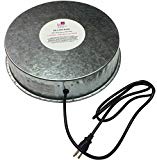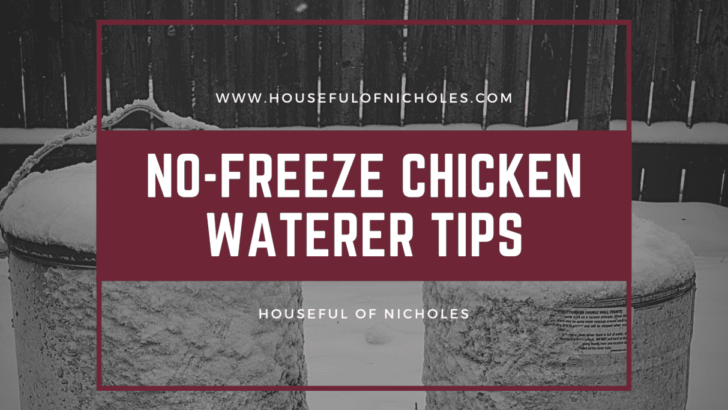It seems to be a no-duh sentiment, but when you live in a place like Chicago, keeping the water for your chickens and other livestock from freezing can be a study in patience. Here are some ideas and suggestions on how you can keep your chicken water from freezing, without having to break the bank, or bring the flock inside.
This post may contain affiliate links

When winter comes, chickens experience a number of challenges that drastically affect their productivity. For maximum productivity, your chickens should always have access to clean water and food. During the winter season, water freezes, making it impossible for the chickens to drink. There are a number of ways you can keep chickens water from freezing, and without further ado, I'm gonna share some with ya! You love it don't you.
Buy a heated waterer
The easiest option for most people would just to buy a heated water bowl, or a heater for your watering can. These run on electricity throughout the day and night and could increase your winter electric bill. However, if you are limited in options, and don't want to head outside every couple of hours to refill your waterer, this may be your best option. Look for one that has good reviews and proven to be long-lasting. They are able to keep the water warm and prevents freezing, making it comfortable for your chicken to drink. The one we use is efficient as it only kicks in when the temperature falls below 35℉ outside, which helps with that electric bill for sure.

The other techniques I have below will work best when you don't have access to electricity or when you want to avoid electrical hazards in your coop.
Break the ice as it forms
This is a basic method of keeping the waterer from freezing and it requires your constant engagement. Although chickens can break down the thin ice themselves, they will require assistance to break through thicker layers of ice when they form. This seems like a tedious and laborious role. However, since ice takes some time to harden and form thick layers, you can survive if you have just a few chickens to take care of. We have 12 now, and the kids don't mind using this method when I've forgotten to plug in our heater.
Use the saltwater technique
Since salt has a very low freezing point it can be ideal in keeping your chicken's water from freezing. In Chicago, it's not odd to see people using salt and alkaline components to clear snow from their driveway and sidewalks. This is the same mechanism being applied here. Find a good plastic bottle and place about a quarter cup of salt inside then let it float in the waterer. Ice will not form and the water will be good for your chicken to consume. You'll notice that you're not putting the salt directly in the water that the chickens will consume, therefore, you aren't increasing the amount of sodium they take in.
Get ducks
Wait, what?! Just hear me out for a moment. This is something that a few of my friends with larger farms have shared with me. How about using other livestock to do all of the work, and bring ducks into the picture? Ducks are naturally active and playful birds. They will spend the day playing and dabbling in the water. With this kind of activity going on, chances of the water freezing go down. You shouldn't worry too much about the water getting contaminated. Chickens naturally scratch for food in the dirt, especially if you let them free-range and they will be able to drink with the ducks comfortably.
Start with warm water
NOT HOT - Hot water freezes faster than cold water - one of these days we'll get into the science behind that, but we're not doing it today. When you go to refill the waterer, you can consider adding warmer water instead of just cold water. Chances are that the water will already have started freezing out and the addition of warm water will reverse this process. The water will still freeze eventually, but the process will slow a bit and give them time to drink up.


Tiffany
Wednesday 13th of November 2019
Hello I am so happy and thrilled to see there are still good people in the world that live like our ancestors lived!!! I always wanted to have my own homestead and would love to learn how to run one. What would be the first step to finding out if we are allowed to have chickens?
Natasha Nicholes
Wednesday 13th of November 2019
Hi Tiffany! You can google livestock ordinances in your city and state and that should give you all of the information that you need. If not, just let me know, and I'll see if I can help you out more.